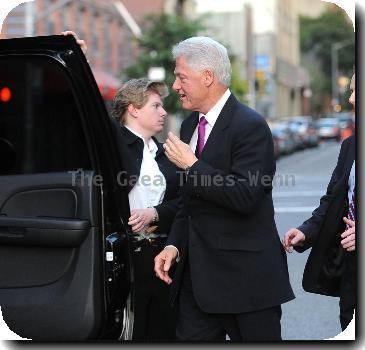Obama envoy: NKorea agrees on need for nuclear disarmament but makes no firm commitment
By Jean H. Lee, APThursday, December 10, 2009
US envoy: NKorea makes no new commitments in talks
SEOUL, South Korea — President Barack Obama’s envoy to North Korea said his trip to Pyongyang yielded a common understanding on the need to restart nuclear disarmament talks — but no clear time frame on when the regime might return to the negotiations.
Stephen Bosworth spent three days ending Thursday in the North Korean capital for the Obama administration’s first high-level talks with Pyongyang after months of nuclear defiance and threatening rhetoric from the communist regime.
Bosworth and his delegation flew to Pyongyang with a clear mission: to coax North Korea to return to the six-nation disarmament talks the regime walked away from earlier this year.
He reported mixed results. Discussions were candid, yet it “remains to be seen when and how the DPRK will return to the six-party talks,” he told a Seoul news conference Thursday, referring to North Korea by its official name, the Democratic People’s Republic of Korea.
Still, “there is a common understanding” on both sides on the need to resume the process, he said, sounding a hopeful note.
U.S. Secretary of State Hillary Rodham Clinton told reporters in Washington that for a “preliminary meeting, it was quite positive.”
State Department spokesman P.J. Crowley urged the North to make a firm commitment to return to the negotiating table.
“They have to make the fundamental decision, and we did not leave the meeting today believing that they had crossed the threshold that we want to see them cross,” he told reporters. “We want to see them come back to the six-party process.”
Analysts called it too early to call Bosworth’s mission a success. Lee Sang-hyun of the Sejong Institute, a think tank outside Seoul, predicted a “tug of war” over when North Korea should rejoin the talks.
“North Korea will only return to the talks after the U.S. offers it a face-saving move or substantial rewards,” he said.
The visit did not include a meeting with leader Kim Jong Il. Kim was busy inspecting a farm and a tractor factory north of Pyongyang during that time, the official Korean Central News Agency said.
North Korea — believed capable of building at least a half-dozen atomic bombs — had been negotiating since 2003 with the U.S., China, Japan, Russia and South Korea on dismantling its nuclear program in exchange for much-needed aid and other concessions.
However, North Korea ditched the talks earlier this year in anger over the international criticism of its ambitions to develop rocket technology that could be used one day to send a long-range missile hurling across the Pacific.
Weeks later, the regime conducted a nuclear test, test-fired a series of ballistic missiles and threatened to restart its nuclear reactor. The defiance earned widespread condemnation and tighter U.N. sanctions. Pyongyang called it a U.S.-North Korea issue, and demanded bilateral talks.
In August, with relations still tense, former U.S. President Bill Clinton traveled to the reclusive nation on a private mission to bring home two jailed American journalists. He sat for three hours with Kim Jong Il — the North Korean leader’s first public appearance with a high-profile figure in a year — in a meeting that appeared to break the ice between the two countries.
North Korea has long sought diplomatic relations with the U.S., which fought for the South Koreans during the three-year Korean War of the 1950s. Washington still has 28,500 troops stationed in South Korea, which technically remains at war with the North because they signed a truce, not a peace treaty, in 1953.
Pyongyang routinely accuses Washington of plotting to attack North Korea, and it cites the U.S. military presence on the peninsula as a chief reason behind its need for an atomic arsenal. The U.S. denies seeking to invade the North.
Bosworth said he conveyed Obama’s message, calling firmly for a “complete denuclearization of the Korean peninsula” and underlining Washington’s willingness to help bring the isolated country back into the international fold. The envoy said discussion of a peace treaty — the prize Pyongyang so desires — could take place within the six-party talks framework.
“As President Obama has made clear, the United States is prepared to work with our allies and partners in the region to offer North Korea a different future,” Bosworth said. “The path for North Korea to realize this future is to choose the door of dialogue in the six-party talks and to take irreversible steps to achieve the denuclearization of the Korean peninsula.”
South Korea’s unification minister, Hyun In-taek, called the flurry of diplomacy a “turning point.”
“Although it’s difficult to say yet what will happen, I expect the steps we have been taking to resolve the North Korean nuclear issue under close cooperation with related nations will pick up speed,” he said Thursday, according to the Yonhap News Agency.
Kim Yong-ho, a North Korea expert at Inha University in South Korea, wasn’t so optimistic. He said neither Washington nor Pyongyang appeared ready to make the concessions required to push the process forward. He also said the resumption of talks hinges on China, which hosts the negotiations and is North Korea’s main ally.
“China is not doing its role,” he said. Beijing must put more pressure on the North to return to the negotiating table, but it has pursued a conciliatory policy toward the communist neighbor.
Associated Press writers Jae-soon Chang and Kwang-tae Kim in Seoul and Matthew Lee in Washington contributed to this report.
Tags: Asia, Barack Obama, Bill Clinton, China, East Asia, Greater China, International Agreements, North America, North Korea, North korean, Nuclear Weapons, Pyongyang, Seoul, South Korea, United States, Weapons Administration, Weapons Of Mass Destruction



